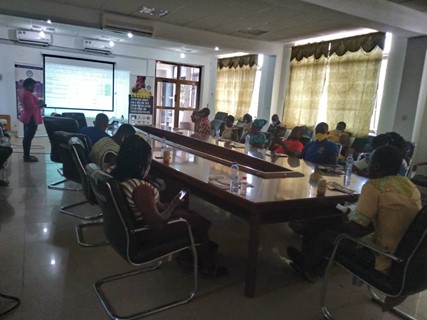The absence of decentralized state institutions is hindering access to essential services and justice by vulnerable communities in the Upper East Region, a study conducted by the Widows and Orphans Movement (WOM), a gender-focused organization has revealed.
The study showed that only the Department of Social Welfare was the most decentralized state institution and had offices in almost all the 15 Municipalities and Districts in the region while the rest did not.
The Executive Director of WOM, Fati Abigail Abdulai who made the findings known to stakeholders in Bolgatanga, noted that the study was part of a four-year project on the theme: “ENOUGH!” being implemented in partnership with Oxfam Ghana and Women in Law and Development (WiLDAF) with funding support from the European Union (EU).
The project aims to empower women, girls, boys, and men to take positive action in ending sexual and gender-based violence in Ghana, Liberia, and Mali.
The Executive Director explained that as part of the implementation of the project, a research was commissioned to ascertain the state of implementation of the Domestic Violence Act of 2007, Act 732, and the Domestic Violence Legislative Instrument of 2016, LI 2237 in the region.
“We employed the participatory process through scorecards to find out the performance level, availability of office space, collaboration among others so that community members will rate the performance of state institutions and the state institutions equally did same. The study covered six communities in the Bongo and Nabdam Districts,” she said.
The findings revealed that due to lack of state institutions at the district and community levels such as the Domestic Violence and Victims Support Unit (DOVVSU), the Commission on Human Rights and Administrative Justice (CHRAJ) and Legal Aid among others, many people were often denied services especially justice.
Also because of poverty in the rural communities, women, especially did not have the resources to travel from their various communities to Bolgatanga, the regional capital to seek justice for being abused.
That, Ms Abduali noted, coupled with high medical fees had denied abused persons access to essential services and justice, increasing the incidence of sexual and gender based violence in the rural communities.
The study revealed that there was no single shelter in the region designated for abused persons.
It, therefore, recommended that the government take urgent steps to create office space and decentralize state institutions to help deliver justice to abused persons especially women and girls who are the most vulnerable.
It further urged the government to operationalize the Domestic Violence Support Fund to enable abused persons to have access to financial support for medical bills and seek justice.
It further called on stakeholders to join synergy to advocate the construction of a shelter for abused persons.
Latest Stories
-
I want to focus more on my education – Chidimma Adetshina quits pageantry
2 hours -
Priest replaced after Sabrina Carpenter shoots music video in his church
2 hours -
Duct-taped banana artwork sells for $6.2m in NYC
3 hours -
Arrest warrants issued for Netanyahu, Gallant and Hamas commander over alleged war crimes
3 hours -
Actors Jonathan Majors and Meagan Good are engaged
3 hours -
Expired rice saga: A ‘best before date’ can be extended – Food and Agriculture Engineer
3 hours -
Why I rejected Range Rover gift from a man – Tiwa Savage
3 hours -
KNUST Engineering College honours Telecel Ghana CEO at Alumni Excellence Awards
3 hours -
Postecoglou backs Bentancur appeal after ‘mistake’
4 hours -
#Manifesto debate: NDC to enact and pass National Climate Law – Prof Klutse
4 hours -
‘Everything a manager could wish for’ – Guardiola signs new deal
4 hours -
TEWU suspends strike after NLC directive, urges swift resolution of grievances
4 hours -
Netflix debuts Grain Media’s explosive film
4 hours -
‘Expired’ rice scandal: FDA is complicit; top officials must be fired – Ablakwa
5 hours -
#TheManifestoDebate: We’ll provide potable water, expand water distribution network – NDC
5 hours

